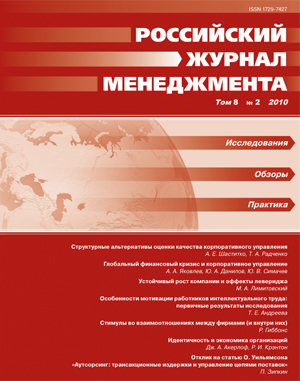Особенности мотивации работников интеллектуального труда: первичные результаты исследования
Аннотация
В современной литературе утверждается, что структура мотивов работников интеллектуального труда существенно отличается от структуры мотивов других работников, однако эмпирические исследования по этому вопросу практически не проводились. В данной статье представлены результаты эмпирического исследования, призванного выяснить, какие же мотивы наиболее значимы для работников интеллектуального труда и действительно ли они существенно отличаются от мотивов традиционной рабочей силы. Результаты исследования позволяют сформулировать ряд рекомендаций по повышению эффективности управления работниками интеллектуального труда.
Ключевые слова:
мотивация работников, работники интеллектуального труда, работники физического труда
Скачивания
Библиографические ссылки
REFERENCES IN LATIN ALPHABET
Загрузки
Опубликован
Как цитировать
Выпуск
Раздел
Лицензия
Статьи журнала «Российский журнал менеджмента» находятся в открытом доступе и распространяются в соответствии с условиями Лицензионного Договора с Санкт-Петербургским государственным университетом, который бесплатно предоставляет авторам неограниченное распространение и самостоятельное архивирование.





